Keyword research is the foundation of every SEO campaign. With an effective keyword research strategy, you will save yourself time by focusing on search queries that people actually use. SEO is time-consuming, and you, therefore, do not want to spend too much time optimizing your site to rank #1 on keywords that no one really searches for.
For brands that operate locally, Local SEO keyword research is critical for the business to benefit from local searches.
What’s Local Keyword Research?
Keyword research can be defined as the process of finding search queries that most
people use on search engines while looking for information, services, or products online. When optimizing a site for search engines, one of the key aspects of the process is finding out the keyword phrases that people are constantly searching in your industry.
Once you have found a list of focus keywords, you should implement them in your webpage content, with the aim of appearing higher on the search engine results page (SERP) whenever people search for those keywords.
To determine which keywords you will focus on, you should pay attention to the search volume, the content you are creating, and what keywords your competitors are ranking for.
When we add the word “local” to the keyword research process, we narrow down to a more specific version of the same. Local SEO means you are optimizing your site for specific geographical locations. The goal of local SEO is to rank better when people do local searches in specific locations.
For instance, you could use a generic keyword followed by the name of a state, county, city, and so forth. For example:
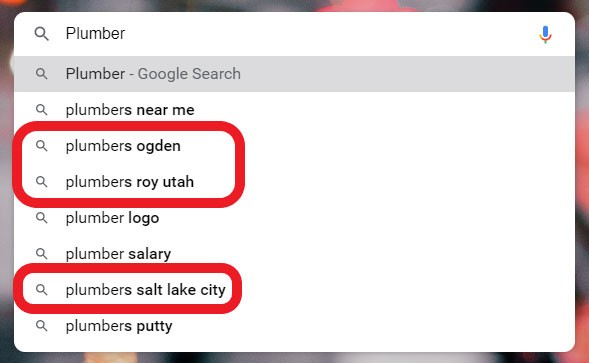
Why is Local Keyword Research Important?
Localized keyword research is important for local SEO campaigns for two major reasons.
The first being that people conducting local searches have an intention to buy. They are searching for a brand to do business with in real-time. Study shows that 29% of people who perform local searches on mobile devices visit or call the business within twenty-four hours.
Businesses that want to draw local customers to themselves should leverage this search intent by paying more attention to local SEO. Part of doing so is determining the most relevant local keywords.
Secondly, Google users are served personalized results after conducting searches. One of the major factors that determine the personalization of results is the user’s physical location. To put it more practically, when one searches for the phrase “Coffee shop,” they are not presented with the world’s top brand ranking for that keyword, but rather the top result in his/her locality.
Google wants to offer its users more relevant results. If you are in Kentucky, coffee shops in Washington will not appear on the search engine results page simply because they will not be useful for you.
Pro tip: You should know the keywords you will be focusing on, plus the locations you are interested in. Without knowledge of the relevant keywords and target locations, you will be missing out on opportunities to tap into local searches, which are accompanied by an intention to purchase.
Since mobile internet surfing has surpassed desktops, it is important that you pay closer attention to local mobile searches. This includes optimizing your website for mobile-friendliness.
You Might Also Like
How to Do Localized Keyword Research
The goal of keyword research in local SEO is finding the most popular local keyword phrases in your industry. Google algorithms are keen on relevancy when ranking websites on SERPs. Studies also reveal that 72% of digital markers attest that relevancy is the major driver of effective SEO.
If the content you are offering on your site is not relevant to what searchers are looking for, then your website will not rank at the top of the SERPs.
Getting Started with Local SEO Research
Most business owners are not aware of the keyword phrases their customers use when searching for specific products and services online. This is typically why keyword research is important. Researching on search queries with high search volume and significant search intent guarantees you that you are focusing your time and energy on relevant keywords.
However, avoid going for keywords with high volume but irrelevant to your website in an attempt to drive more traffic to your business. Relevancy of a webpage’s content to the search keyword used is among Google’s major ranking factors. You can use tools to find out the search volume for a keyword, for example:
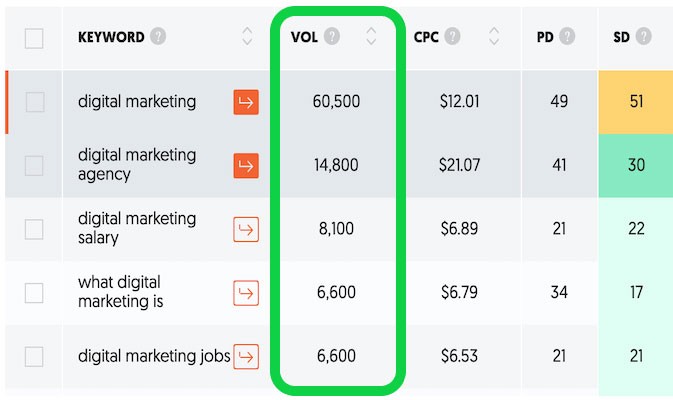
(Image Credit: Neil Patel)
When the keywords used are irrelevant to your website, it will not only struggle to rank for them but if it actually does, visitors are more likely to bounce back to the SERPs without interacting with the website.
A high bounce back rate is a signal that a page is not helpful to visitors despite its ranking for that particular keyword. When Google senses this, it will rank that page lower in the SERPs.
Finding Local Keywords
Although there are numerous approaches to finding local keywords, some of the most effective ones include:
Test your SEO in 60 seconds!
Diib is one of the best SEO tools in the world. Diib uses the power of big data to help you quickly and easily increase your traffic and rankings. We’ll even let you know if you already deserve to rank higher for certain keywords.
- Easy-to-use automated SEO tool
- Keyword and backlink monitoring + ideas
- Speed, security, + Core Vitals tracking
- Intelligently suggests ideas to improve SEO
- Over 500,000k global members
- Built-in benchmarking and competitor analysis
Used by over 500k companies and organizations:
Syncs with 
Industry Related Keywords
You need to first identify the keyword phrases that are relevant to your industry or line of business. This typically means finding common phrases that your customers are likely to use when searching for your products and services.
A simple way of doing this is by asking yourself this question:
“If I were a member of the general public and interested in one of the products or services I am selling, what keyword phrases would I use on Google?”
This will help you come up with a list of keywords ranging from industry-specific phrases to product names. Industry-related keywords are particularly important in B2B marketing. You can also look at the keywords your competitors rank for. For example:
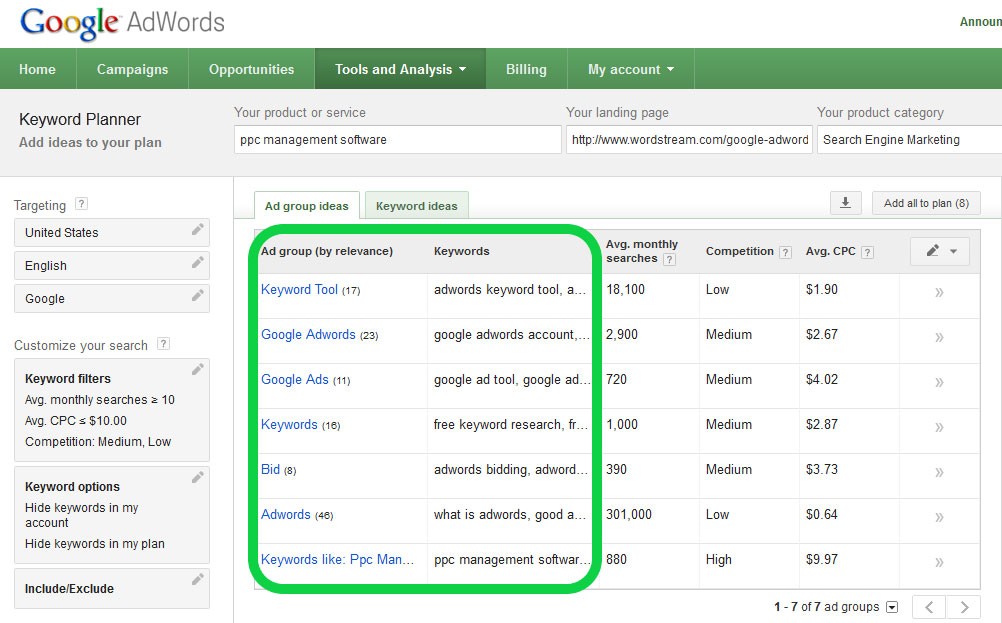
(Image Credit: WordStream)
Using Keyword Modifiers
You should also pay attention to keyword modifiers that might apply to searches. Modifiers are words describing the type of product, service, quality, or occasions for use. Examples of keyword modifiers are:
- Best
- Top
- Where
- How
- Buy
- Cheap
Words such as “fast,” “buy,” “free,” and “cheap” are common keyword modifiers that searchers use. Using them alters the intent behind the focus keyword, and this has the potential of improving your click-through rate (CTR) because they’re more enticing.
It is also recommended that you use keyword modifiers that are relevant to your business or industry. If you are a florist for example, words such as “birthday,” “delivery,” and “wedding” are industry-relevant modifiers.
Including Local Based Keywords
The basis of any local SEO plan is finding keywords with the “local” element. It is common for people to search for businesses that are closer to them. It is, therefore, important that you leverage the location factor in your marketing strategy. This includes the location of your business as well are the locations in which your target market works or lives.
It is also important that you include the names of target locations in your on-page SEO, metadata, and URLs. You should also have a landing page for every specific location. This helps you offer customers in that location content that is relevant to their intent.
Using local keywords in social media and in blog posts also helps in cementing your brand’s association with those locations.
Google Local Keywords Research Tips
- Use Google Autocomplete. By just keying in the seed keyword in Google, it will offer you a number of keyword phrases with the main keyword in them. (Image Below)
- Focus on the Main Business Keywords as well. For most industries and brands, the main keywords are obvious. To localize them, use the Product/Service +Location formula.
- Always Spy on What Your Competitors are Doing. When you understand your competitor’s strategy, it becomes easier for you to outdo them by focusing on what they are blind to.
- Include the Services in Locations. You should always add the localized keyword in your metadata.
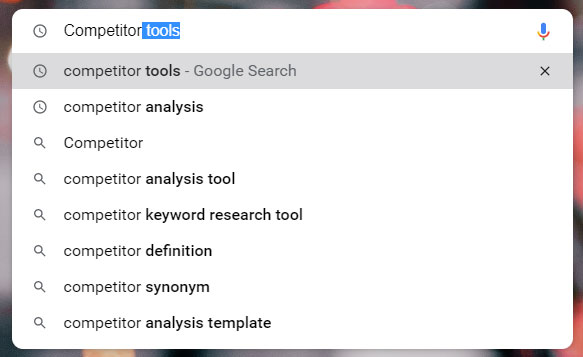
How To Select the Keywords to Focus On
The general rule is that you should work with keywords with high search volumes and are relevant to your website and business. This helps you attract more traffic and achieve a higher ranking in SERPs because Google can tell your content is relevant to the search intent.
However, it is important to note that focusing on keywords with high search volumes means you are up to face stiff competition. For this reason, you should boost or supplement your local SEO strategy with On-page SEO, link building, social signals, and high brand awareness.
Proximity To Searcher
Since Google considers the searcher’s location, you will benefit significantly from focusing on broader competitive local keywords. For instance, a word like “restaurant” is very competitive but vague in its nature. If the search term was to be combined with personalized search results and local SEO, the business offering the service stands a greater chance of ranking at the top of the SERPs for high-traffic high-competition keywords.
Regardless of the local keywords you choose to focus on, it is important that you optimize your site for great SEO performance through the creation of quality content, social media, and link building. When your overall SEO is poor, your site will not rank high for local keywords even after integrating local keywords with high search volumes.
To see keyword search volumes and difficulties, you will need the help of various keyword research tools.
We hope that you found this article useful.
If you want to know more interesting about your site health, get personal recommendations and alerts, scan your website by Diib. It only takes 60 seconds.
Keyword Research Tools
Although Google Keyword Planner is the most popular keyword research tool, there are other equally resourceful tools out there. Some of them include:
- Ahrefs Keywords ExplorerKeywords Everywhere
- AnswerThePublic
- Moz Keyword Explorer
- Suggestion Keyword Finder
- SEMRush
- QuestionDB
- Ubersuggest
Most people have their preference for keyword research tools. You can try them out to find out the one that works best for you. You are probably wondering how these tools are used for local SEO research. Here is how:
Finding Search Volume for Local Keywords
There are several tools you could use to find a keywords search volume.
Ahrefs Keyword Explorer
When on Ahrefs keyword explorer, enter the keyword or keyword phrase you are interested in, and the tool will display its search volume. Besides search volume, this tool also gives you information on other metrics such as keyword difficulty, cost per click, and average monthly clicks. For instance:
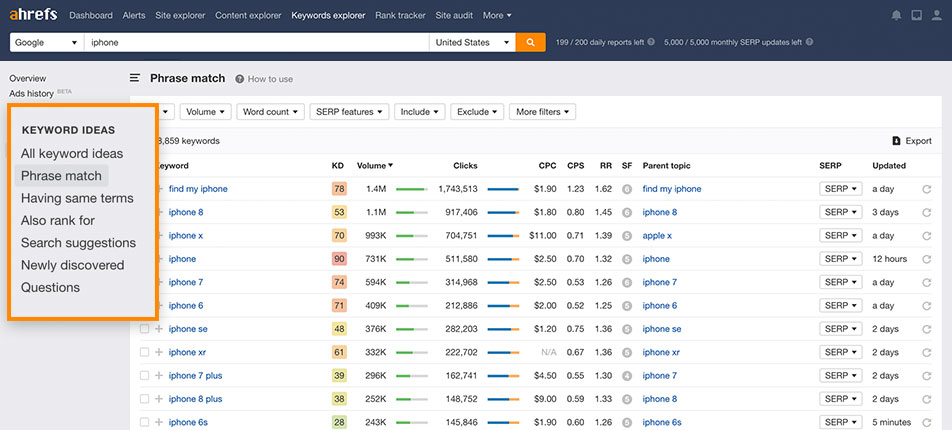
(Image Credit: Ahrefs)
KWFinder
This is another resourceful tool for local search keyword research. All you have to do is key in your keywords and the tool generated data like volume, search trends, difficulty, and an overview of the SERP for the keyword. For instance:
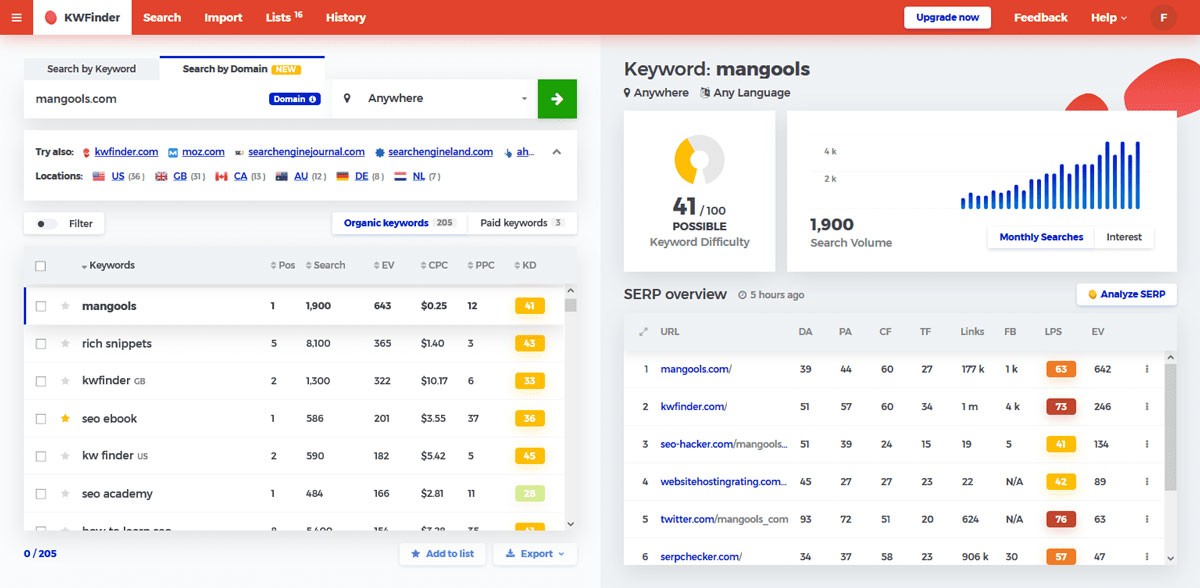
(Image Credit: KWFinder)
Keyword Everywhere
This add-on or extension displays the keyword’s search volume on the SERPs. All you have to do is install the Keyword Everywhere Chrome extension. However, this tool will not provide you with a lot of data about the keywords like the other two, but it helps you grab the information you need on the fly, and it is totally free. For example:
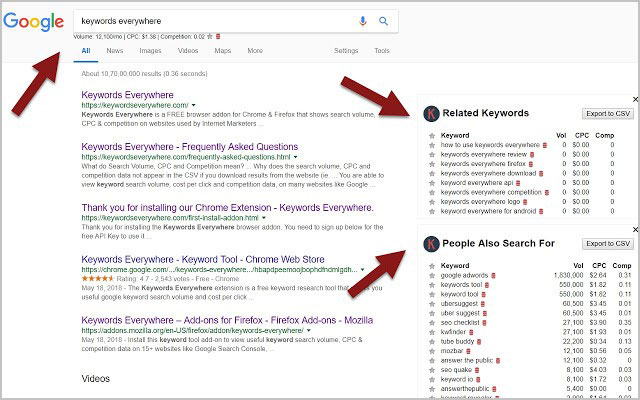
(Image Credit: Keyword Everywhere)
Keyword Difficulty
This is yet another factor that you should definitely pay attention to. Generally, some keywords are easier to rank for than others. You will, therefore, have to decide whether to optimize for keywords that are difficult to rank for or go for the low-hanging fruits.
When a keyword is highly relevant to your brand, you cannot discount it on the basis of it having a greater difficulty. There are various tools that measure a keyword’s difficulty, among them being:
Ahrefs: This tool assesses the difficulty of a keyword by looking at its chances of ranking among the top 10 results. The keyword difficulty is measured on a scale of 0-100 from low difficulty to high difficulty.
KWFinder: It calculates the difficulty based on pre-defined metrics by Majestic, Moz, and your know-how, which includes page authority, domain authority, trust flow, and citation flow.
How to Expand Your Local Keyword List
Typing your seed keyword in Ubersuggest is a quick and great way to generate related keywords and keyword variations that will help in expanding your keywords list.
Question-Based Keywords
Questions are a common way for people to find information from the internet. Some of the tools you can use to create a list of question keywords are:
QuestionDB: This tool helps you generate a list of question keywords. After typing your seed keyword or the topic you are creating content on, it will generate a list of question-based keywords, which you can export as a spreadsheet.
AnswerThePublic: This is yet another great tool that you can use to generate a long list of questions that people ask about your seed keyword. You can toggle the list into a view that is easier to read, and it’s also exportable in the form of a spreadsheet.
Getting Ahead In the Local SEO Space
Local SEO is constantly changing, but you can always stay ahead of the pack and rank at the top by following the following tips.
Open and Optimized Google My Business Page
I cannot stress enough how important Google My Business is to your business. Studies show that about 19% of local search rankings come from My Business signals.
Creating Localized Content
Creating long, location-based, and informative content is necessary. The content can be in the form of news, local promotions, or industry trends. The most important thing is that you should create content that is helpful to the locals seeking it.
Citations
Backlinks are such an important component of your SEO campaign. External links bring about legitimacy to your brand as the local people link to your webpages. Using local directories like Google Listing and Yelp helps in building a strong backlink profile.
Reviews
About 88% of online shoppers trust online reviews the same way one would trust a personal recommendation from a peer. You definitely want to attract positive reviews as opposed to negative ones. The challenge comes in sourcing them, but once you have, the reward is worth the struggle. It’s recommended that you encourage your clients to share their journey and experiences with your brand.
Results monitoring
Monitoring results is a crucial part of the digital marketing process. The reason why we monitor results is that we want to know whether our efforts are actually paying off. You will have to track your focus keywords to find out whether they have helped you improve your website’s ranking. There are many SEO tools that are specifically designed to track the performance of local keywords alone.
Summary
Local SEO cannot be achieved overnight. It is an ongoing process necessitating consistency and attention on the various SEO best practices and ranking factors. This can be interpreted to mean that local SEO keyword research is a critical step that you must take to make sure your efforts do not go to waste.
Some of the key things you should remember when it comes to Google local search keyword research are:
- Focusing on Google local keywords that have high search volume
- Not neglecting the overall SEO strategy
- Making sure the selected keywords are relevant to your website content
- Leveraging the broad keywords with high competition for local searches.
Find Your Local SEO Keywords Today with Diib®!
Diib Digital keyword research tool offers a complete list of your local SEO keywords along with the keywords of your top 6 competitors. Find what’s working and what isn’t, create content around the keywords that are relevant to your industry. Here are some of the features of our User Dashboard we’re sure you’ll love:
- Keyword, backlink, and indexing monitoring and tracking tools
- User experience and mobile speed optimization
- Bounce rate monitoring and repair
- Social media integration and performance
- Broken pages where you have backlinks (404 checker)
- Technical SEO monitoring
Click here for your free scan or simply call 800-303-3510 to speak to one of our growth experts.
FAQ’s
Here a few tips to help with your local keyword research:
- Look for the main keywords in your business niche. Usually the main keyword will be pretty obvious.
- Add the keyword + location you are in into your metadata. This way the search engine will recognize the keyword and the area and put you in local searches.
- Search a basic keyword into Google search engine and look at the autocomplete answers.
- Use competitor tools to research and/or spy on your competitors.
The local SEO strategy helps your business become more visible on search engines of those customers in your area. If you have a business that has a physical location you can use local SEO to boost your business.
When a user does a search on Google local SEO works just as a normal search query would. Google would scan to provide the best options for the specific search query. However, the unique thing with local SEO is that Google uses a few different factors to rank the local searches to make sure you get the best results closest to you.
Location specific words or phrases that are related to a specific geographic location are considered local keywords. Local keywords play a vital role in helping drive users to your website and/or business that can benefit from the close proximity.
To get your SEO keywords you first need to determine what your goals are. This could mean short or long term goals. Then you need to decide the blend of short and long tail keywords you will want in your article or web page. Then use keyword tools or other methods to do keyword research and come up with a list. Now narrow down your keyword list to those that will be the most relevant and beneficial. Finally, pick the top keywords from your list.



